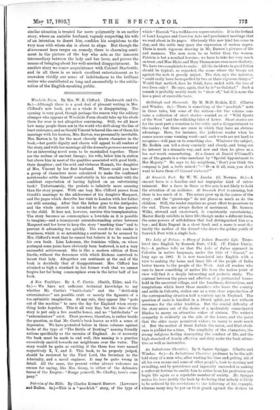Woodside Farm. By Mrs. W. K. Clifford. (Duckworth and Co.
6s.)—Although there is a good deal of pleasant writing in Mrs. Clifford's new book, yet as a whole it is disappOinting. The opening is very good, though perhaps the reason why the solitary stranger who appears at Woodside Farm should take up his abode there for ever is not altogether convincing. Still, we all know how many people there are in the world who drift along the line of least resistance, and as Gerald Vincent behaved like one of these, his marriage with his hostess, Mrs. Barton, was presumably inevitable. Mrs. Barton is by far the most cleverly drawn character in the book,—her gentle dignity and charm will appeal to all readers of the story, and with her marriage all the dramatis personae necessary for an interesting novel seem to be marshalled together. These are the recluse of ancient lineage ; his wife, below him in station but above him in most of the qualities associated with good birth ; their daughter ; and the acid and virtuous Hannah, the daughter of Mrs. Vincent by her first husband. Where could you have a group of characters more calculated to make the confirmed novel-reader settle himself comfortably in his armchair with the confident expectation of having lighted on an entertaining book? Unfortunately, the prelude is infinitely more amusing than the story proper. With one leap Mrs. Clifford passes from Gerald's marriage to the adolescence of his daughter Margaret, and the pages which describe her visit to London with her father are still amusing. After that the father goes to the Antipodes, and the whole interest is intended to shift from the parents to the child. It does not, however, survive this transplantation. The story becomes as commonplace a love-tale as it is possible to imagine,—and a transparent misunderstanding arises between Margaret and her lover to keep the story "marking time" and to prevent it advancing too quickly. The result for the reader is weariness, which is so astonishing a sentiment to be aroused by Mrs. Clifford's work that he cannot but believe it to be somehow his own fault. Lina Lakeman, the feminine villain, on whose portrayal some pains have obviously been bestowed, is not a very successful achievement. She is like a modern edition of Rosa Dartle, without the fierceness with which Dickens contrived to invest that lady. Altogether our sentiment at the end of the book is decidedly that of disappointment. Mrs. Clifford has attained so high a standard in her former work that we cannot forgive her for being commonplace even in the latter half of her book.






































 Previous page
Previous page